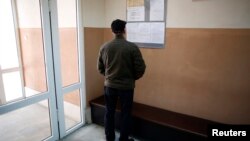VRATSA —
The factories of Vratsa that once fed Bulgaria's chemical and metallurgical industries and provided jobs are abandoned now. Crumbling buildings and pitted roads add to the city's gloomy air.
For people like Alexander Angelov, 27, work is hard to find and his thoughts are turning to trying his luck abroad, as many Bulgarians have before him.
The northwestern city, in the poorest part of the European Union's poorest country, is a microcosm of the challenges facing whoever wins a national election on May 12. Its population has fallen by a fifth to 59,000 since 1989.
More than two million people have left Bulgaria since the fall of communism, bringing the population down to 7.3 million.
Protesters have taken to the streets to complain about low wages, high bills and deep-seated corruption and to demand more spending to help the economy recover from a deep recession.
That pushed Boiko Borisov's center-right government to resign in February. His GERB should still be the largest party after the poll but a hung parliament is likely and could raise questions over economic policy, under which Bulgaria has kept debt low to maintain a currency peg to the euro.
Angelov, who studied business administration and has worked in construction, car sales and installing solar panels, only finds work for a few days at a time.
It is not enough for him, his partner and baby daughter and they need money from his mother in Greece to get by.
He and his partner are not eligible for benefits and he worked only 25 days in seven months, bringing in 700 levs ($470). Food and diapers for the baby cost 300 levs a month and the December electricity bill alone was 345 levs.
“We will endure a bit more, for the child to grow up a little, to be able to speak, and we will go abroad somewhere,” Angelov said in his living room in a crumbling communist-era block, where worn-out furnishing attests to their struggles.
Unemployment of 12 percent is lower than in crisis-hit eurozone states such as Greece and Spain. But such countries are attractive to Bulgarians whose living standards are less than half the EU average.
Those who find jobs earn an average monthly wage of 400 euros ($520) - less than the minimum in Spain or Greece - yet 70 percent of students are considering leaving if they get a job offer abroad, according to accounting firm Deloitte.
For waitress Mariana Tsvetkova, even moving to Spain, with a jobless rate of more than 25 percent, was a better bet than staying at home.
The 48-year-old mother of two left in January and found work washing dishes and cleaning houses in the Spanish city of Malaga.
“Things were getting worse and worse in Bulgaria. It's hard to find a job in Sofia, and when you do, it's for peanuts,” Tsvetkova said by telephone from Spain.
The economic woes of Bulgaria and other ex-communist countries have also added to anti-immigrant feeling in Western Europe, with Britain's right-leaning press warning of hordes of Bulgarians and Romanians flooding in.
Nationalists benefit
Bulgaria's 4.9 percent drop in employment in 2012 was the EU's highest. Although official unemployment is in line with the EU average and lower than in Spain, Portugal or Greece, people fall out of official data after a year and industry officials say the real rate is closer to 18 percent.
“Even more worrying, the real unemployment among young people under 29 years of age is close to 40 percent,” said Dimitar Brankov, a deputy chairman of Bulgaria's leading business association BIA.
Six people leave every hour in search of a better life, said to Bozhidar Tomalevski, the head of the Drugata Bulgaria party, which represents Bulgarians abroad.
The finance ministry estimates the proportion of people over 64 will rise from 19 percent to a quarter by 2030, adding ever more strain to a creaking social security system.
The nationalist Attack party has been the main beneficiary of discontent and with five percent support, could hold the balance of power in parliament.
It has alarmed investors with pledges to nationalize energy distributors, raise taxes for the rich and revoke concessions for gold and water.
The interim government is redirecting 20 million levs ($13 million) to create 16,000 temporary jobs but the European Commission says a more concerted effort, including labor and education reform, is needed.
That will take too long for Angelov, who plans to join his mother in Greece, where she works caring for an elderly lady and sends back 300 euros a month.
“If there is even the slightest chance to find a job in Greece, I will leave right then,” he said.
For people like Alexander Angelov, 27, work is hard to find and his thoughts are turning to trying his luck abroad, as many Bulgarians have before him.
The northwestern city, in the poorest part of the European Union's poorest country, is a microcosm of the challenges facing whoever wins a national election on May 12. Its population has fallen by a fifth to 59,000 since 1989.
More than two million people have left Bulgaria since the fall of communism, bringing the population down to 7.3 million.
Protesters have taken to the streets to complain about low wages, high bills and deep-seated corruption and to demand more spending to help the economy recover from a deep recession.
That pushed Boiko Borisov's center-right government to resign in February. His GERB should still be the largest party after the poll but a hung parliament is likely and could raise questions over economic policy, under which Bulgaria has kept debt low to maintain a currency peg to the euro.
Angelov, who studied business administration and has worked in construction, car sales and installing solar panels, only finds work for a few days at a time.
It is not enough for him, his partner and baby daughter and they need money from his mother in Greece to get by.
He and his partner are not eligible for benefits and he worked only 25 days in seven months, bringing in 700 levs ($470). Food and diapers for the baby cost 300 levs a month and the December electricity bill alone was 345 levs.
“We will endure a bit more, for the child to grow up a little, to be able to speak, and we will go abroad somewhere,” Angelov said in his living room in a crumbling communist-era block, where worn-out furnishing attests to their struggles.
Unemployment of 12 percent is lower than in crisis-hit eurozone states such as Greece and Spain. But such countries are attractive to Bulgarians whose living standards are less than half the EU average.
Those who find jobs earn an average monthly wage of 400 euros ($520) - less than the minimum in Spain or Greece - yet 70 percent of students are considering leaving if they get a job offer abroad, according to accounting firm Deloitte.
For waitress Mariana Tsvetkova, even moving to Spain, with a jobless rate of more than 25 percent, was a better bet than staying at home.
The 48-year-old mother of two left in January and found work washing dishes and cleaning houses in the Spanish city of Malaga.
“Things were getting worse and worse in Bulgaria. It's hard to find a job in Sofia, and when you do, it's for peanuts,” Tsvetkova said by telephone from Spain.
The economic woes of Bulgaria and other ex-communist countries have also added to anti-immigrant feeling in Western Europe, with Britain's right-leaning press warning of hordes of Bulgarians and Romanians flooding in.
Nationalists benefit
Bulgaria's 4.9 percent drop in employment in 2012 was the EU's highest. Although official unemployment is in line with the EU average and lower than in Spain, Portugal or Greece, people fall out of official data after a year and industry officials say the real rate is closer to 18 percent.
“Even more worrying, the real unemployment among young people under 29 years of age is close to 40 percent,” said Dimitar Brankov, a deputy chairman of Bulgaria's leading business association BIA.
Six people leave every hour in search of a better life, said to Bozhidar Tomalevski, the head of the Drugata Bulgaria party, which represents Bulgarians abroad.
The finance ministry estimates the proportion of people over 64 will rise from 19 percent to a quarter by 2030, adding ever more strain to a creaking social security system.
The nationalist Attack party has been the main beneficiary of discontent and with five percent support, could hold the balance of power in parliament.
It has alarmed investors with pledges to nationalize energy distributors, raise taxes for the rich and revoke concessions for gold and water.
The interim government is redirecting 20 million levs ($13 million) to create 16,000 temporary jobs but the European Commission says a more concerted effort, including labor and education reform, is needed.
That will take too long for Angelov, who plans to join his mother in Greece, where she works caring for an elderly lady and sends back 300 euros a month.
“If there is even the slightest chance to find a job in Greece, I will leave right then,” he said.






